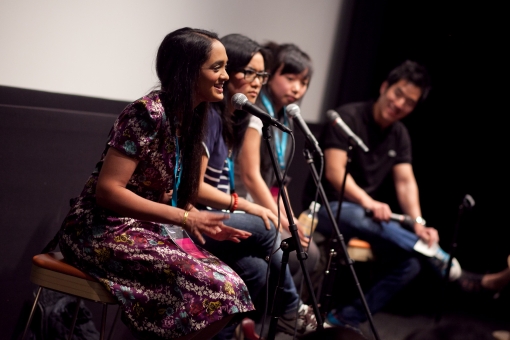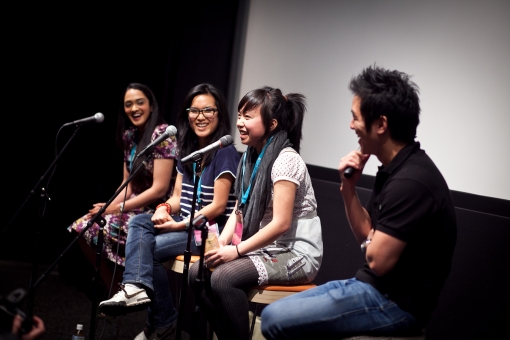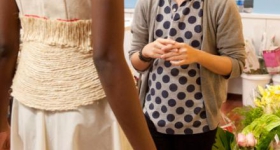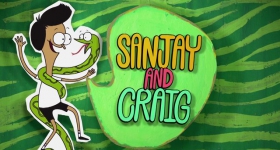Photos by Myleen Hollero. From left: Anisha Nagarajan, Ali Wong, Thu Tran
By Nicole Wong
Three female comedians walk into the Viz Cinema theater: a stand-up comic, a TV actress, and a YouTube discovery. Wait, have you heard this one before? Then you were probably in attendance at “Look Who’s Laughing Now: Breakout Female Comedians,” one of seven engaging panels that took place at this year’s San Francisco International Asian American Film Festival. “Look Who’s Laughing Now” -- moderated by actor Leonardo Nam (Vantage Point, He’s Just Not That Into You) -- featured Ali Wong, Anisha Nagarajan, and Thu Tran, a trio of talented ladies who shared their experiences of what it’s like to be Asian American funny people.
“There’s something so serious about the Asian American experience that it deserves to be mocked.” --Ali Wong
Ali Wong is a San Francisco-native who was awarded the Best of the Bay title for her stand-up comedy by both SF Weekly and the SF Bay Guardian in 2009. After moving to New York to improve her craft, she now lives in LA, working on buffing up her film and TV résumé in order “to get butts in seats” at her stand-up shows.
“If ‘get off the bus, Gandhi!’ is the worst insult I’m ever going to get, then that’s pretty good.” --Anisha Nagarajan
Anisha Nagarajan plays Madhuri on NBC’s Thursday night comedy Outsourced. As a sophomore at NYU, Nagarajan was cast in the Broadway musical Bombay Dreams. Nagarajan was born in Evanston, IL, and grew up in Pittsburgh, acting in every school play and listening to her parents enacting Shakespeare on tape during road trips, which she cited as an early “interesting” inspiration. She attended boarding school in India for a year when she was fifteen, which has been helpful for her current role.
“They say you can’t polish a turd, but that’s what we do on the show. We work with garbage and make it look as nice as we can.” --Thu Tran
Thu Tran, a Vietnamese Cleveland native who now resides in Brooklyn, lives the dream of anyone who has ever posted a video on YouTube. Tran is the creator and host of Food Party, a wildly creative “cooking show” in which she hangs out with food puppets in a Technicolor cardboard kitchen. Trained in glass-blowing and the visual arts, her videos started out as a way of preserving the large-scale installation art she created, which serve as sets. Her quirky webisodes were discovered on YouTube and picked up by the IFC.
The panel covered a range of significant topics with levity and humor, making for a thoroughly enjoyable night of comedy, reflection, and entertainment. The panelists mulled over how race factors into comedy, dealing with pressure from family and critics, the need to focus on one’s personal strengths, the fascination of porn for women, and choosing to follow non-traditional careers while still keeping the love and support of their parents (which they all have, at least when they’re working).
The rapport was easy and supportive between the four of them, showcasing each entertainer’s strong stage presence and natural sense of humor as they quickly riffed off of each other’s jokes and comments. The fun spontaneity of the event was a pleasure not only to the audience but festival organizers as well. Festival Director Masashi Niwano commented on “Look Who’s Talking Now”: “People have a pre-conceived notion about panels, which is that they’re boring. I loved that the female comedians displayed such a range in types of comedy and humor. It was interactive, and not stuffy at all. The audience was really into it.” [Watch the complete live stream of the panel from CAAM]

After the panel, I had the opportunity to interview the three panelists to discuss their creative processes, what they strive for in their work, strip clubs, and why they don’t actually like watching comedy.
At the panel, Ali said she sees herself as a stand-up comic first, and an actress second. Anisha and Thu, how would you define yourselves?
AN: Well, I’ve never really thought of myself as a comedian until right now. I’ve usually been cast as an earth woman or a romantic, so it’s thrilling to actually be considered a “funny” actress. When I was invited to this event as a comedian, I thought, “Hmmm, maybe that is what I am doing on the show.”
TT: And you are funny! I tell people that I’m an artist first, a visual artist. I’m a performer second or third or fourth or something like that. I like doing funny stuff. It’s fun. I think that if it’s fun for me then hopefully it’ll be funny for someone else. With the show, we just wanted to make something that looked cool.
You all come from very different comedy backgrounds. Have any of you met before?
AW: Thu and I met at a Vietnamese panel, generally for Vietnamese creatives. I remember people were really into food and we talked about sandwiches for like twenty minutes.
TT: Yes, everyone had strong opinions about them.
What challenges have you faced being Asian Americans and females in the comedy world? And how has it influenced your comedy?
AW: I really don’t think it’s helpful for me to pay attention to challenges. But I would say that one challenge of being a female comic is that headliners [on tour] just want a buddy to go to strip clubs with. More than being a woman is that I’m a sober person. All comedians drink and so much social interaction depends on that strip club culture.
TT: Oh, I go out to strip clubs when I’m on tour with my group. I’m curious about them. These women are just making money like anyone
else. I do it because I want to hang out with my buddies, and it’s just fun to hang in general. I’m a big hanger.
AW: It’d probably be better for networking purposes if I did go to strip clubs, but I just don’t want to do it. I’m an old lady. I like to go to bed at ten. After this interview, I’m going to go home, exercise and go to sleep, wake up at my parents’ house, eat oatmeal, and exercise again.
Stand-up comedy is like a fraternity. You’ll always have a social network to plug in to. It’s a very tight fraternity, and if you’re funny, then you’re in, in whatever city, like right away and that’s it. What is really challenging for me is this whole audition process [for film and TV]. Just because you can act doesn’t mean you can audition well.
And as you mentioned in the panel, the majority of roles for Asians or Asians Americans are for “sexy Asian bombshell” types of characters.
AW: The goal is just to be a 3-dimensional woman and character. Who is that egotistical to think, “I’m representing the Indian American experience, or Asian American experience”? You’re just doing that character, that is your job, and as long as you’re doing that it’s like fuck everyone else and what they think. They can say whatever they want but your goal is to be as 3-dimensional as possible, and you have control of that. And she [Anisha] does that well. Very well! So, I don’t know, [munching thoughtfully on pretzels from her schwag bag] that’s what you concentrate on.
TT: With Food Party, a lot of the dishes were obviously influenced by my background. I’m always going to be “that Asian girl.” The only thing I can do is just present myself the best way I can. That’s what everyone should do, just be the best person they can. Just be aware that Asian people are looking at you because you look like them. I do that when I watch TV. I’m like, “Oh, an Asian girl? I’ll watch this for a second.” Doing the show, I don’t want to embarrass myself or do anything that might humiliate my family.
Anisha, as that person on TV, how do you feel knowing that Asian Americans are pausing their remotes to stop and watch you?
AN: When the show first started filming I don’t think I realized what an impact the show has on a lot of young people. I didn’t realize that the subject matter was going to be so family-oriented. Because it’s an ethnic show, you have whole [Indian] families that are watching, from the kids to adults and grandparents. One time we were doing interviews and a sponsored walk on a beach in Santa Monica, and there were a whole bunch of Indian families with their kids. The amount of children that came up to us at that walk? I was just amazed. My first thought was, “Are you old enough to watch the show?” But after that I was like, “Wow, it’s really because of the cultural significance.” It’s become a family show.
AW: And it’s not just that they’ll watch it together, but that they’ll talk about it. I think that’s the more important part. It’s all about the human relationships.
What are things that you think are funny right now?
TT: I religiously watch RuPaul’s Drag Race, online. I think it’s hilarious. One of the things I said to my ex-boyfriend, when he called me back, I totally quoted RuPaul: “If you can’t love yourself, then how the hell are you gonna love anybody else?”
AN: Whenever I want to laugh I watch Coming to America. It’s just one of my favorite comedy movies.
TT: That movie has the best opening ever.
AW: “The royal penis is clean, Your Highness.”
AN: In the past year I’ve definitely watched it 5 times, probably more.
AW: I really like 30 Rock, but I actually don’t like watching comedy. I see it every night. I really like watching drama. Friday Night Lights, True Blood, The Wire, all those shows. Drama is so different, there’s so much effort; it’s so produced. Comedy is produced, but I see through the matrix so I just don’t enjoy it as much.
TT: I get that. I see what you mean. When you do funny stuff you don’t watch funny stuff. You can’t draw inspiration from funny stuff because...
AW: … it’s already done! There’s no element of surprise. I’m a little bit better than average at predicting what the punch line is going to be. But with drama it’s just always going to blow my mind.
TT: It’s like if you’re a magician and you’re watching a magic show. You just know what’s happening.
AN: There’s the rabbit, coming out of the hat. Done, done.
What is your creative process like?
TT: It’s very long with me. It starts with a little idea that we joke around with, and if it’s a funny idea then we’ll write about it. I mainly work with three of my friends. So we’ll write some stuff, then we compare. That takes about a week. Then we start drawing pictures about it. Then we draw for two weeks. This would be for a video. Then we do concept drawings for another few days. After that, make the stuff for it: props, drawings, outfits, figure out what and how we can make things. Then, I have to call people, to see if they’re free so they can help me film something funny. Then they come over, if I can’t pay them then I feed them or hang out with them for a long time. I make it a fun time -- it’s a very involved hang-out sesh. That’s how I frame it. It’s not work, you’re going to hang out with me and its going to be fun!
AN: Outsourced is exciting because every week it’s a different script. That’s what I love about TV, versus theater when you’re working with the same script for the whole time. That’s the background I came from. I did a lot of theater in New York before coming to the show. The most fun part for me is not knowing what the writers are going to throw at you next for your character, and being able to go with that. It’s very exciting for me.
Do you prefer one over the other, theater or television?
AN: I think there’s a beauty to both. Delving into a character so intensely every day and doing that repetition of a role can really help you realize who that person is on a great level. It’s always hard though, because sometimes theater runs are short and so the moment you feel like you’re really digging deep and delving into it, it’s over. It’s a little bit sad, but I definitely like both mediums.
AW: A lot of stand-ups sit and write. I’ll just have an idea, and work it into a set. I record my sets, and I’ll re-word stuff until it becomes perfect, or if it’s just not funny I’ll just give it up. I try to listen to my tapes every night. It’s good for reflection.
How and when did you first start doing stand-up?
AW: After college [at UCLA], I just started going to open mics up here in the Bay. I started working at the Punch Line as a host. My first year, I got my first set for TV and it was for this show on Comedy Central produced by Jamie Foxx. I completely ate it, and it didn’t air. I think it was a really good experience in the way it taught me like, “God I better get good, before more of these opportunities come.” It was opportunity that was really wasted because I wasn’t ready. I want to be able to do stand up for the rest of my life and doing film and TV just adds years to your career.
Stand-up is the only thing I was every really good at. I look at my friends who go to law school, and take the bar, and I’m just like, “That’s amazing, taking the bar?” A lot of people do it but it scares me. That’s crazy to have one day to take that test and your chances get lower and lower. To me, that’s a lot scarier than performing stand-up. Doing Broadway and singing [like Anisha]? That’s really scary!
TT: I still have some stage fright. I work in video so I have a lot of chances to try out a lot of variations. In front of people I only have one shot.
Ali, you were on the cover of Hyphen back in 2007, the Transit Issue. How far have you come since then and how has your comedy changed?
AW: That was so long ago! I don’t even know. Back then I was still wearing my hair in those Chun Li buns. I don’t do any of that stuff anymore. At some point, I just decided they were stupid. I was trying to be taken seriously as a comic, and that just wasn’t helping.
Nicole Wong is a contributing editor at Hyphen.










Comments